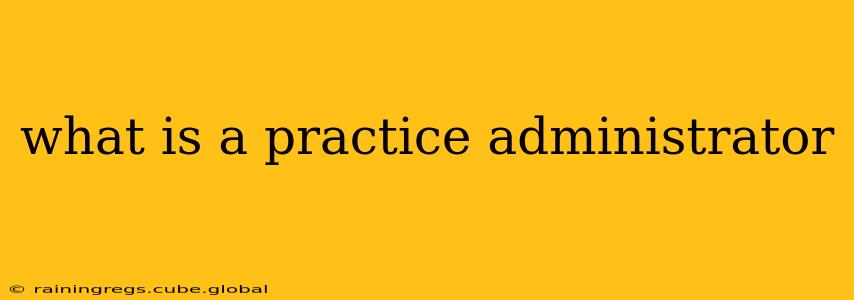A practice administrator is a crucial behind-the-scenes role responsible for the smooth and efficient running of a professional practice, encompassing various aspects of operations, management, and human resources. While often associated with healthcare (medical practices, dental offices, etc.), the title and responsibilities extend to other professional settings like law firms, architectural practices, and even some consulting firms. They are the glue that holds the organization together, ensuring everything operates effectively so the professionals can focus on their core competencies.
What are the Responsibilities of a Practice Administrator?
The specific duties of a practice administrator can vary depending on the size and type of practice, but some common responsibilities include:
- Financial Management: This is a major component, encompassing budgeting, billing, accounts payable and receivable, payroll processing, and financial reporting. They ensure the practice's financial health and stability.
- Human Resources: This includes hiring, onboarding, training, performance management, and handling employee relations. They are vital in maintaining a positive and productive work environment.
- Operations Management: This involves overseeing daily operations, managing schedules, ensuring adequate supplies and equipment, and handling maintenance and repairs. This ensures the practice runs smoothly and efficiently.
- Compliance and Regulatory Affairs: Staying compliant with all relevant regulations (HIPAA in healthcare, for example) is crucial. The administrator often leads this effort.
- Marketing and Business Development: While not always the primary focus, many administrators contribute to marketing efforts, patient outreach, and business development initiatives.
- Information Technology (IT): Managing the practice's IT infrastructure, software, and data security is a growing responsibility for practice administrators.
- Strategic Planning: In larger practices, administrators may participate in strategic planning, helping to set the long-term goals and direction of the organization.
What Skills Does a Practice Administrator Need?
A successful practice administrator needs a diverse skillset, combining strong organizational and leadership abilities with technical proficiency:
- Strong organizational and time management skills: Juggling numerous tasks and priorities is essential.
- Excellent communication skills: Effective communication with staff, clients, and other stakeholders is crucial.
- Proficiency in financial management: Understanding budgeting, accounting, and financial reporting is vital.
- Human resources expertise: Knowledge of employment law, performance management, and employee relations is essential.
- Problem-solving and decision-making skills: The ability to quickly identify and resolve problems is crucial.
- Leadership and team management abilities: Motivating and managing a team effectively is key.
- Technical proficiency: Experience with relevant software and technology is increasingly important.
What is the Difference Between a Practice Manager and a Practice Administrator?
The terms "practice manager" and "practice administrator" are often used interchangeably, and the distinctions can be subtle. In many cases, they have similar responsibilities. However, some might argue that a practice manager focuses more on the day-to-day operational aspects, while a practice administrator may have a broader scope, including strategic planning and longer-term goals. The specific titles and responsibilities often depend on the organizational structure of the practice.
What education and experience are needed to become a practice administrator?
The educational requirements vary. Some administrators have a bachelor's degree in business administration, healthcare administration, or a related field. Others gain experience through on-the-job training and professional certifications. Relevant certifications like Certified Medical Practice Executive (CMPE) can enhance career prospects. Experience in a similar role, often starting in a support capacity, is generally required.
Is a Practice Administrator a good career path?
For those with strong organizational, financial, and leadership skills, a career as a practice administrator can be both rewarding and challenging. It offers the chance to make a significant impact on the success of a professional practice while utilizing a wide range of skills. The field is constantly evolving, requiring adaptability and ongoing professional development.
This comprehensive overview should provide a clear understanding of the multifaceted role of a practice administrator. Remember that the specific duties and requirements can vary widely depending on the size and type of practice.
